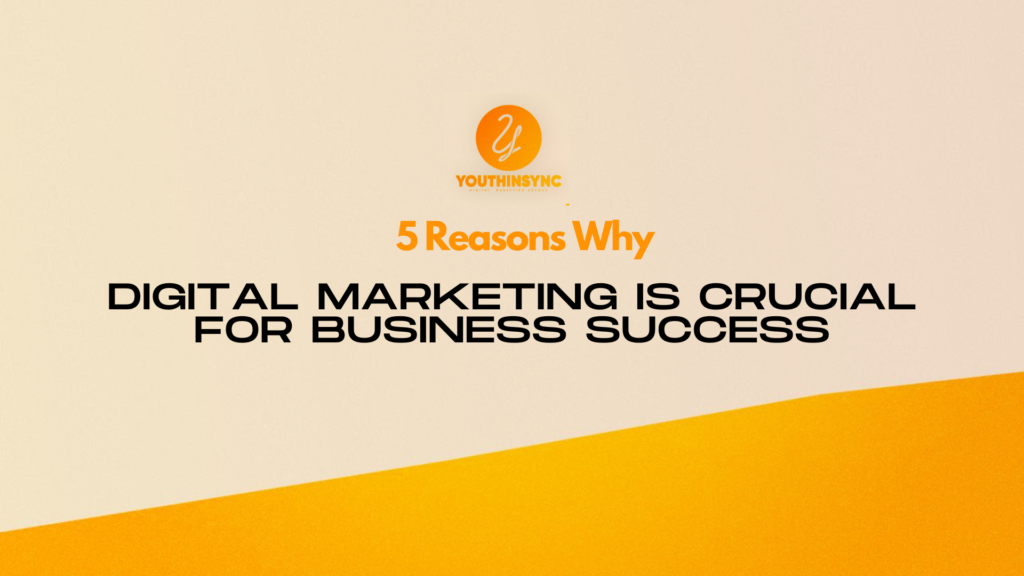In today’s fast-paced digital world, the success of a business hinges on its ability to connect with customers where they spend most of their time: online.
Traditional marketing methods, while still relevant, are no longer sufficient to keep up with the competition. This is where digital marketing steps in. From expanding your reach to engaging with customers in meaningful ways, digital marketing offers unparalleled opportunities for growth. In this blog, we’ll explore the top five reasons why digital marketing is crucial for business success.
1. Increased Reach and Global Accessibility
One of the most significant advantages of digital marketing is its ability to reach a global audience. Unlike traditional marketing methods, which are often limited by geography and time, digital marketing knows no bounds. With the internet, businesses can connect with potential customers across the world, 24/7, breaking down the barriers that once confined them to local markets.
Expanding Beyond Geographical Boundaries
Digital marketing enables businesses to target audiences far beyond their physical location. Whether through search engine optimization (SEO), social media marketing, or paid advertising, businesses can make their presence felt in markets they never thought possible. For example, a small boutique in a remote town can sell its products globally through an e-commerce website, reaching customers in different countries with the right digital marketing strategies.
Leveraging Multiple Online Channels
Moreover, digital marketing offers multiple channels to reach your target audience. Whether it’s through social media platforms like Facebook, Instagram, or LinkedIn, or through email marketing campaigns and online ads, businesses can tailor their strategies to different audiences across various channels. This multi-channel approach ensures that your brand message is seen by a diverse audience, increasing your chances of converting leads into customers.
Case Study: Airbnb’s Global Reach
Consider the case of Airbnb, which started as a small startup and grew into a global phenomenon largely through digital marketing. By leveraging SEO, social media, and content marketing, Airbnb was able to reach a global audience, turning potential travelers into loyal customers. The company’s ability to market its platform online played a crucial role in its success, proving the power of digital marketing in expanding reach and accessibility.
2. Cost-Effectiveness Compared to Traditional Marketing
Digital marketing is not only effective but also cost-efficient, making it accessible to businesses of all sizes. Unlike traditional marketing methods such as television ads, billboards, or print media, which can be expensive and out of reach for many small businesses, digital marketing offers affordable alternatives that deliver significant returns on investment (ROI).
Affordability for Small Businesses
For small businesses with limited budgets, digital marketing levels the playing field, allowing them to compete with larger enterprises. Pay-per-click (PPC) advertising, social media ads, and content marketing are just a few examples of digital marketing strategies that can be implemented at a fraction of the cost of traditional methods. Additionally, many digital marketing tools, such as Google Analytics and social media scheduling platforms, are available for free or at a low cost, enabling businesses to manage their campaigns efficiently.
Higher ROI with Digital Campaigns
Moreover, digital marketing provides a higher ROI than traditional marketing. This is because digital campaigns can be precisely targeted, reducing wastage and ensuring that your marketing dollars are spent on reaching the right audience. With tools like Google Ads or Facebook Ads, businesses can set their budget, target specific demographics, and measure the success of their campaigns in real-time, allowing for quick adjustments to optimize performance.
Case Study: Dollar Shave Club
Dollar Shave Club, a subscription-based razor company, is a prime example of how digital marketing can drive business success on a budget. The company used a viral video marketing campaign to reach millions of potential customers online, spending only a fraction of what traditional TV ads would have cost. The campaign’s success catapulted Dollar Shave Club into the mainstream, leading to its acquisition by Unilever for $1 billion. This case illustrates how digital marketing can provide exceptional value and results, even for small businesses.
3. Enhanced Targeting and Personalization
One of the key strengths of digital marketing lies in its ability to target specific demographics and personalize content. Unlike traditional marketing, where the message is often broad and generic, digital marketing allows businesses to tailor their messaging to individual preferences and behaviors, resulting in more effective campaigns.
Precision Targeting with Data Analytics
Digital marketing platforms, such as Google Ads and social media advertising, offer advanced targeting options that allow businesses to reach specific segments of their audience. Marketers can target users based on factors like age, gender, location, interests, and even online behavior. This level of precision ensures that your marketing efforts are focused on those most likely to convert, maximizing the effectiveness of your campaigns.
Personalized Content for Better Engagement
Personalization is another powerful aspect of digital marketing. By leveraging data and analytics, businesses can create personalized content that resonates with individual customers. Personalized email campaigns, product recommendations, and targeted ads are just a few examples of how personalization can improve customer engagement and drive conversions. Studies have shown that personalized marketing leads to higher click-through rates, increased customer satisfaction, and stronger brand loyalty.
Case Study: Amazon’s Personalized Shopping Experience
Amazon is a master of personalized marketing. The company uses sophisticated algorithms to analyze customer behavior and deliver personalized recommendations based on browsing history, purchase patterns, and preferences. This personalized shopping experience has been a key factor in Amazon’s success, driving repeat purchases and customer loyalty. By using data-driven personalization, Amazon ensures that each customer feels valued, leading to a more satisfying shopping experience and higher sales.
4. Improved Customer Engagement and Interaction
In the digital age, customer engagement is more important than ever. Digital marketing provides businesses with the tools and platforms needed to interact with customers in real-time, fostering relationships that go beyond one-time transactions.
The Power of Social Media Engagement
Social media platforms like Facebook, Instagram, Twitter, and LinkedIn offer businesses unique opportunities to engage with their audience. Through posts, comments, and direct messages, businesses can interact with customers, answer their questions, and address their concerns instantly. This direct line of communication helps build trust and loyalty, turning casual followers into brand advocates.
Two-Way Communication with Customers
Digital marketing also enables two-way communication, where customers can engage with businesses just as easily as businesses can engage with them. Whether through social media, email, or live chat, customers appreciate the ability to communicate their needs and receive timely responses. This level of engagement enhances the customer experience and strengthens the relationship between the brand and the consumer.
Case Study: Starbucks’ Social Media Engagement
Starbucks has mastered the art of customer engagement through social media. The company uses platforms like Instagram and Twitter to connect with its customers, share user-generated content, and run interactive campaigns. One notable example is the “Red Cup Contest,” where Starbucks encouraged customers to share photos of their holiday-themed cups for a chance to win prizes. The campaign generated massive engagement, with thousands of customers participating and sharing their content, helping to boost brand visibility and customer loyalty.
5. Measurable Results and Data-Driven Decisions
One of the most significant advantages of digital marketing is the ability to track and measure the success of your campaigns. Unlike traditional marketing, where results are often difficult to quantify, digital marketing provides a wealth of data that can be analyzed to make informed decisions and optimize future campaigns.
Tracking Key Metrics with Digital Tools
Digital marketing platforms offer a range of tools and analytics that allow businesses to track key performance indicators (KPIs) such as website traffic, conversion rates, click-through rates, and customer engagement.
Google Analytics, for example, provides detailed insights into how users interact with your website, where they come from, and what actions they take. This data is invaluable for understanding what works and what doesn’t, enabling businesses to refine their strategies and improve their ROI.
Making Data-Driven Decisions for Better ROI
Data-driven decision-making is a cornerstone of successful digital marketing. By analyzing the data collected from campaigns, businesses can identify trends, uncover opportunities, and make adjustments in real-time. This agility allows businesses to respond to market changes quickly, optimize their marketing efforts, and achieve better results. Whether it’s adjusting ad spend, refining targeting criteria, or tweaking content, data-driven decisions lead to more effective and efficient marketing.
Case Study: Netflix’s Data-Driven Marketing
Netflix is a prime example of a company that uses data to drive its marketing strategies. The streaming giant collects vast amounts of data on viewer preferences, watching habits, and engagement. This data is then used to personalize content recommendations, optimize user experience, and inform marketing campaigns. By leveraging data, Netflix ensures that its content resonates with its audience, leading to higher retention rates and customer satisfaction.
Conclusion
In today’s competitive business landscape, digital marketing is not just an option—it’s a necessity. From expanding your reach to engaging with customers in meaningful ways, digital marketing offers a wealth of opportunities for businesses to grow and thrive. By embracing digital marketing strategies, businesses can achieve cost-effective marketing, enhanced targeting, improved customer engagement, and data-driven success.

